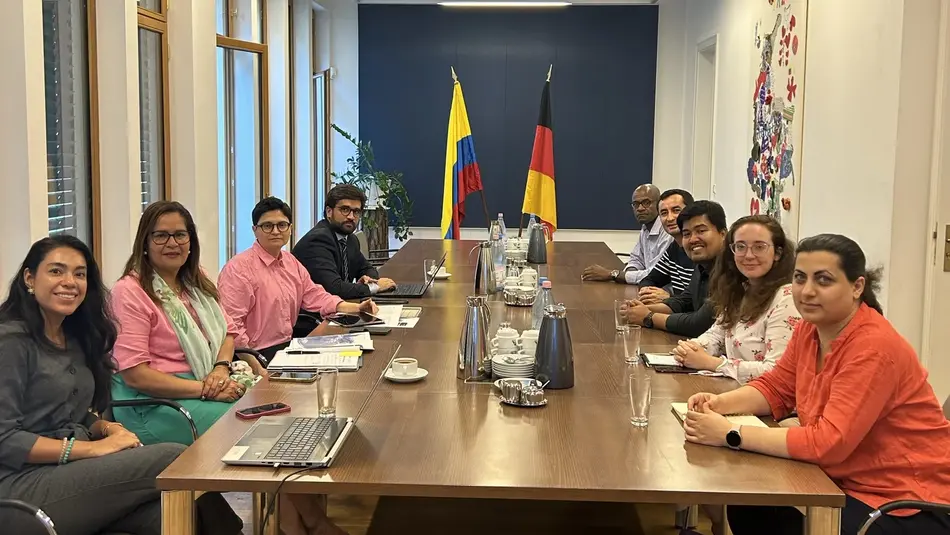On August 15th, 2023, the second-year students at the Brandt School had the privilege to present the policy brief entitled “Fighting Corruption in the Security Sector for Sustainable Peace” to the Ambassador of Columbia to Germany, H.E. Yadir Salazar Mejía; the Plenipotentiary Minister, Juana Castro Santamaría; and the First Secretary of Foreign Affairs, David Azula. The policy brief is an outcome of the capstone project the students were engaged in during their third semester as a part of the practical training component of the MPP program. It was produced with the collaboration of the Willy Brandt School of Public Policy and the German Colombian Peace Institute – CAPAZ, which was focused on supporting the new Government of Colombia in its efforts related to security sector reform and its connection to the implementation of the peace agreement.
The meeting with the Ambassador and the representatives of the diplomatic mission at the Embassy of Colombia in Berlin served as an early possibility to discuss and communicate the policy brief to the primary stakeholders, aimed at supporting the policy making in the security sector for sustainable peace in Colombia. The Ambassador greatly valued the importance and quality of the policy brief, highlighting that it delved deeply into the issues related to the peace process in Colombia, providing valuable insights and recommendations. Most notably, the Ambassador mentioned that the policy brief will be shared both with her interlocutors in Colombia and Germany. One of the project participants, Inés Beatriz Alberico, noted:
“It was very satisfying to have the possibility to deliver our policy brief to the Ambassador of Colombia, who was very engaged with its content. Now we know that the relevant stakeholders in the Government will receive our recommendations, which could lead to real policy impact”.
The policy brief emphasises the significance of security sector reform in the post-conflict context, describes the challenges for putting such changes into practice, and highlights the negative effects of corruption in the security sector on state legitimacy and the capacity of the state to protect its population. The policy brief discusses the impact of corruption both on state and societal levels and provides recommendations to tackle the lack of confidence and trust between people and security sector representatives. More specifically, the paper advocates for meritocratic promotion in the security sector, its responsibility for and responsiveness to the provision of basics necessary for human security and development for the communities, as well as the inclusion of civil society representatives in trainings for the representatives of the security sector which will enable alternatives to indoctrinated ideologies enrooted as a result of the civil war. One of the project participants, Ani Tovmasyan, accentuated:
“For someone coming from a conflict affected region and professionally having been involved in peacebuilding in my own region, which is not always an encouraging and sometimes emotionally exhaustive engagement, the peace process in Colombia provides hope and potential for conflict transformation in other parts of the world. The opportunity we had to contribute to this process during a time of momentum when there is a vast possibility of impacting the policy and the openness of the decision-makers to take into consideration the recommendations coming from research and practitioner groups, is truly empowering experience”.
This project group and the whole process of policy brief production was guided by the Head of Conflict Studies and Management specialization, Dr. Alejandra Ortiz-Ayala, who added:
“I am very happy that we achieved the last milestone of our project group: visiting the Colombian Embassy, encountering the ambassador, and ensuring that the work that the students did in the policy brief has visibility among decision makers. I feel very proud of my students!”.
The meeting also provided opportunity to discuss collaboration possibilities between the Willy Brandt School and the Embassy of Colombia in Germany, such as fostering the engagement of Colombian scholars and academics in Germany for joint initiatives, as well as supporting some of the ongoing projects such as “Everyday Practical Peacebuilding”, conducted by the Brandt School. As a part of the upcoming capstone project, the students specializing in peace and conflict studies will have the chance to implement this one-year project focused on enshrining everyday peace practices among students and society in Thuringia. The project, supported with the grant from the European Solidarity Corps, aims to engage the local community in Thuringia by enabling environments where people with different political interests, backgrounds, and beliefs will be able to engage in a dialogue, with its ultimate objective being fighting structural racism, xenophobia and preventing right-wing motivated conflicts in the society.

